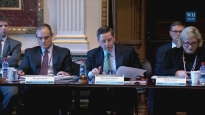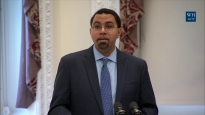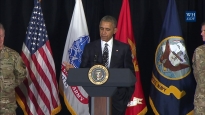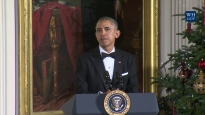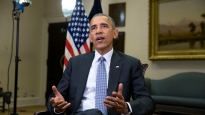President Obama Speaks at the Dedication of the Cesar Chavez National Monument
October 08, 2012 | 12:46 | Public Domain
President Obama delivers remarks at a dedication ceremony for the Cesar Chavez National Monument in Keene, California.
Remarks by the President at the Dedication of the Cesar Chavez National Monument, Keene, CA
La Paz, Chavez National Monument
Keene, California
11:50 A.M. PDT
THE PRESIDENT: Good morning! Buenos dias! (Applause.) Si, se puede! (Applause.) Thank you. Thank you so much.
AUDIENCE: Four more years! Four more years! Four more years!
THE PRESIDENT: Thank you, everybody. Thank you so much. I am truly grateful to be here. It is such a great honor to be with you on this beautiful day, a day that has been a long time coming.
To the members of the Chavez family and those who knew and loved Cesar; to the men and women who've worked so hard for so long to preserve this place -- I want to say to all of you, thank you. Your dedication, your perseverance made this day possible.
I want to acknowledge the members of my administration who have championed this project from the very beginning -- Secretary Ken Salazar, Secretary Hilda Solis, Nancy Sutley. (Applause.) To Governor Brown, Mayor Villaraigosa -- (applause) -- Congressman Grijalva -- they are here. We are grateful for your presence. And I also want to recognize my dear friend, somebody we're so proud of -- Arturo Rodriguez, the current president of the UFW. (Applause.)
Most of all, I want to thank Helen Chavez. (Applause.) In the years to come, generations of Americans will stand where we stand and see a piece of history -- a tribute to a great man and a great movement. But to Helen, this will always be home. It’s where she fought alongside the man that she loved; where she raised eight children and spoiled 31 grandchildren and 15 great-grandchildren. (Applause.) This is where she continues to live out the rest of her days.
So, Helen, today we are your guests. We appreciate your hospitality, and you should feel free to kick us out whenever you want. (Laughter.)
Today, La Paz joins a long line of national monuments -- stretching from the Statue of Liberty to the Grand Canyon -- monuments that tell the story of who we are as Americans. It's a story of natural wonders and modern marvels; of fierce battles and quiet progress. But it's also a story of people -- of determined, fearless, hopeful people who have always been willing to devote their lives to making this country a little more just and a little more free.
One of those people lies here, beneath a rose garden at the foot of a hill he used to climb to watch the sun rise. And so today we celebrate Cesar Chavez. (Applause.)
Cesar would be the first to say that this is not a monument to one man. The movement he helped to lead was sustained by a generation of organizers who stood up and spoke out, and urged others to do the same -- including the great Dolores Huerta, who is here today. (Applause.)
It drew strength from Americans of every race and every background who marched and boycotted together on behalf of "La Causa." And it was always inspired by the farm workers themselves, some of whom are with us. This place belongs to you, too.
But the truth is we would not be here if it weren’t for Cesar. Growing up as the son of migrant workers who had lost their home in the Great Depression, Cesar wasn’t easy on his parents. He described himself as "caprichoso" -- (laughter) -- capricious. His brother Richard had another word for him -- (applause) -- stubborn.
By the time he reached 7th grade, Cesar estimated he had attended 65 elementary schools, following the crop cycles with his family, working odd jobs, sometimes living in roadside tents without electricity or plumbing. It wasn’t an easy childhood. But Caesar always was different. While other kids could identify all the hottest cars, he memorized the names of labor leaders and politicians.
After serving in the Navy during World War II, Cesar returned to the fields. And it was a time of great change in America, but too often that change was only framed in terms of war and peace, black and white, young and old. No one seemed to care about the invisible farm workers who picked the nation’s food -- bent down in the beating sun, living in poverty, cheated by growers, abandoned in old age, unable to demand even the most basic rights.
But Cesar cared. And in his own peaceful, eloquent way, he made other people care, too. A march that started in Delano with a handful of activists -- (applause) -- that march ended 300 miles away in Sacramento with a crowd 10,000 strong. (Applause.) A boycott of table grapes that began in California eventually drew 17 million supporters across the country, forcing growers to agree to some of the first farm worker contracts in history. Where there had once been despair, Cesar gave workers a reason to hope. "What [the growers] don't know," he said, "is that it's not bananas or grapes or lettuce. It's people."
It’s people. More than higher wages or better working conditions, that was Cesar’s gift to us -- a reminder that we are all God’s children, that every life has value, that, in the words of one of his heroes, Dr. King, "we are caught in an inescapable network of mutuality, tied in a single garment of destiny."
Cesar didn’t believe in helping those who refused to help themselves, but he did believe that when someone who works 12 hours a day in the fields can earn enough to put food on the table and maybe save up enough to buy a home, that that makes our communities stronger, that lifts up our entire economy.
He believed that when a worker is treated fairly and humanely by their employer that adds meaning to the values this country was founded upon, and credence to the claim that out of many, we are one. And he believed that when a child anywhere in America can dream beyond her circumstances and work to realize that dream, it makes all our futures just a little bit brighter. (Applause.)
It was that vision, that belief in the power of opportunity that drove Cesar every day of his life. It’s a vision that says, maybe I never had a chance to get a good education, but I want my daughter to go to college. Maybe I started out working in the fields, but someday I’ll own my own business. Maybe I have to make sacrifices, but those sacrifices are worth it if it means a better life for my family.
That’s the story of my ancestors; that’s the story of your ancestors. It’s the promise that has attracted generations of immigrants to our shores from every corner of the globe, sometimes at great risk, drawn by the idea that no matter who you are, or what you look like, or where you come from, this is the place where you can make it if you try. (Applause.)
Today, we have more work to do to fulfill that promise. The recession we're fighting our way back from is still taking a toll, especially in Latino communities, which already faced higher unemployment and poverty rates. Even with the strides we’ve made, too many workers are still being denied basic rights and simple respect. But thanks to the strength and character of the American people, we are making progress. Our businesses are creating more jobs. More Americans are getting back to work.
And even though we have a difficult road ahead, I know we can keep moving forward together. (Applause.) I know it because Cesar himself worked for 20 years as an organizer without a single major victory -- think about that -- but he refused to give up. He refused to scale back his dreams. He just kept fasting and marching and speaking out, confident that his day would come.
And when it finally did, he still wasn’t satisfied. After the struggle for higher wages, Cesar pushed for fresh drinking water and worker’s compensation, for pension plans and safety from pesticides -- always moving, always striving for the America he knew we could be.
More than anything, that’s what I hope our children and grandchildren will take away from this place. Every time somebody’s son or daughter comes and learns about the history of this movement, I want them to know that our journey is never hopeless, our work is never done. I want them to learn about a small man guided by enormous faith -- in a righteous cause, a loving God, the dignity of every human being. I want them to remember that true courage is revealed when the night is darkest and the resistance is strongest and we somehow find it within ourselves to stand up for what we believe in. (Applause.)
Cesar once wrote a prayer for the farm workers that ends with these words:
Let the Spirit flourish and grow,
So that we will never tire of the struggle.
Let us remember those who have died for justice,
For they have given us life.
Help us love even those who hate,
So we can change the world. (Applause.)
Our world is a better place because Cesar Chavez decided to change it. Let us honor his memory. But most importantly, let’s live up to his example. (Applause.)
Thank you. God bless you. (Applause.) God bless America. Si, se puede! (Applause.)
AUDIENCE: Si, se puede! (Applause.)
THE PRESIDENT: Si, se puede. (Applause.)
AUDIENCE: Si, se puede! (Applause.)
THE PRESIDENT: Thank you, everybody. (Applause.)
END
12:04 P.M. PDT
|
December 7, 2016
|
December 7, 2016
|
December 7, 2016
|
December 6, 2016
|
|
December 6, 2016
|
December 5, 2016
|
December 4, 2016
|
December 3, 2016
|
- &lsaquo previous
- …
- 3
- 4
- 5
- 6
- 7
- 8
- 9
- 10
- 11
- …
- next &rsaquo

